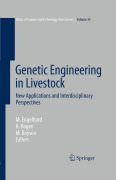
Genetic engineering in livestock: new applications and interdisciplinary perspectives
Engelhard, M.
Hagen, K.
Boysen, M.
Recently, the first ‘zoopharming’ product has reached market approval: it is a recombinant human protein for medical use that is produced in the milk of transgenic goats. In addition, other transgenic animals, including faster-growing salmon and „environmentally friendly’ pigs with reduced levels of phosphate in their faeces are awaiting regulatory approval. These are only some examplesof upcoming applications of genetic engineering in farm animals. Other potential applications include traditional breeding goals such as higher milk or meat yields, leaner meat, and disease resistance. While genetic engineering in livestock opens a huge range of possibilities, it also brings about concerns of safety and justification: does genetic engineering affect animal welfare? Is it safe and morally acceptable to apply genetic engineering to farm animals forthe various purposes that are envisaged? INDICE: Introduction.- Transgenic farm animals: current status and perspectives for agriculture and biomedicine.- Novel developments in techniques to generate transgenic animals.- Animal welfare perspectives on the creation of transgenic farm animals.- Assessing the welfare of transgenic farm animals.- Ethical aspects of livestock genetic engineering.- Current developments in zoopharming.- Market development of biopharmaceuticals.
- ISBN: 978-3-540-85842-3
- Editorial: Springer
- Encuadernacion: Cartoné
- Páginas: 146
- Fecha Publicación: 01/11/2008
- Nº Volúmenes: 1
- Idioma: Inglés
